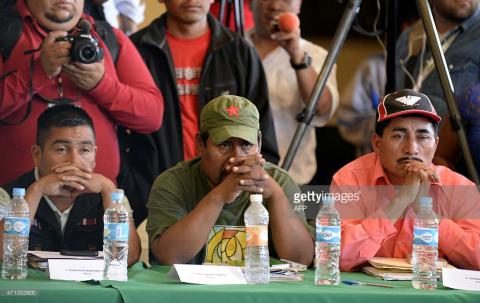After two months of striking, marching and blocking roads, farmworkers in Baja California, Mexico have finally reached an agreement with the Mexican government that may end their current struggle for better wages and working conditions.
Mexican government officials and farmworker leaders held an 18-hour meeting in Ensenada, Mexico starting on May 13 that ended the next day with the government agreeing to meet several demands of the striking workers. Among the demands being met by the government are requirements that companies get certification ensuring that they’re not using child labor, social security benefits for retired farmworkers, equal rights and pay for women, housing built for laborers, recognition of the farmworkers’ union, and healthcare for workers.
“This is an agreement that will help us construct an orderly, peaceful, respectful and responsible way to provide a better quality of life for those workers who live in the valley of San Quintin,” Baja California Gov. Francisco “Kiko” Vega de Lamadrid told the Los Angeles Times.
The agreement is set to be finalized on June 4, but the issue of wage increases, one of the strikes central demands, has not been fully settled yet. The workers have demanded a raise to 200 pesos ($13) per day. Government officials agreed to pay whatever wage increase for the farmworkers is not met by the agribusinesses that employ them.
“If [the growers] say they’ll pay 180 pesos, the federal government will pay the other 20 pesos,” Justino Herrera, a leader of the Alliance of National, State and Municipal Organizations for Social Justice, the coalition of indigenous workers that started the strike, explained to KBPS.
Nonetheless, Fidel Sanchez, the spokesperson for the worker coalition, remained hopeful about the agreement.
“Perhaps we haven’t achieved everything we wanted, however for us it is extremely important that we have immediate affiliation of the workers in the fields with the Mexican Institute of Social Security — in this way, farmworkers will be attended to,” Sanchez told FreshFruitPortal.com.
The agreement took place days after clashes between police and striking workers on May 9 left 70 injured. Images of workers injured and shot with rubber bullets during the clashes soon spread online, turning public opinion against the government. In addition to the strike, which has cost the region millions of dollars in unpicked produce, the farmworkers also called for an international boycott of the strawberries, cucumbers, tomatoes and other vegetables they pick. U.S. Rep. Juan Vargas even introduced a “Stop Blood Tomatoes” bill to Congress, which aimed to end child and forced labor at farms that sell to U.S. retailers by requiring independent audits of these farms.
Labor leaders like Sanchez and Herrera also gained previous experience organizing workers during their time working in the United States. Herrera once led a work stoppage in Oregon against an abusive employer. Sanchez helped put together a boycott against tomato farmers in Florida. Many of the farmworkers in Baja California have also worked in U.S. fields and have seen the gains won by organized labor. As a result, many of them returned to Mexico fully aware of what could be achieved through the use of organized protests and have applied this knowledge in their current struggle.
“I don’t have educational experience. I don’t have an intellectual background,” Sanchez told the Los Angeles Times. “All I have is my education from life experiences, learning from others. Cesar Chavez was an example I learned from, that we shouldn’t live submissively.”


Spread the word